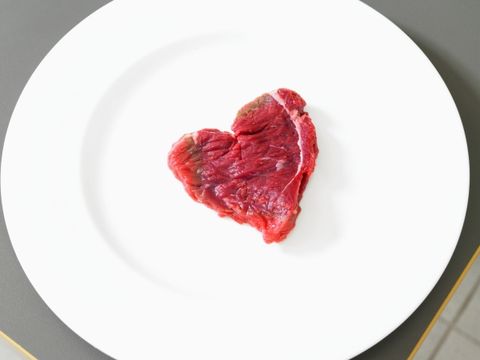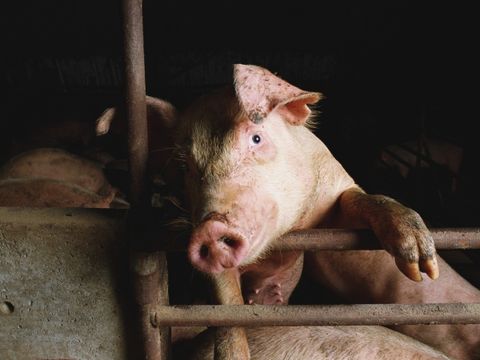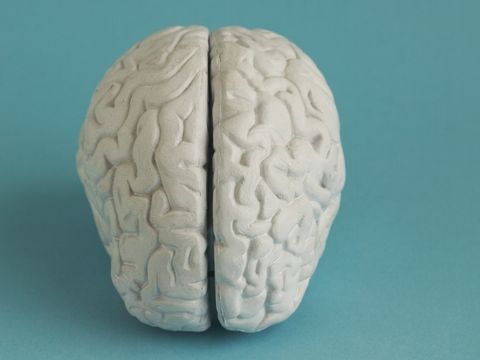Pregnant Anemic but I Don't Eat Red Meat
If you're thinking of going vegetarian (or at least flexitarian, for those who want a side of meat with their plants), this list is all the motivation you'll need. The health and environmental costs of our meat-based food system might be enough to make you want to swap that steak for a salad—for good.
1. Eating meat hardens blood vessels

A compound found in red meat (and even used as an additive in some energy drinks) called carnitine has been found to cause atherosclerosis, the hardening or clogging of the arteries, according to a study published in the journal Nature Medicine. The research, which included more than 2,500 vegans, vegetarians, and omnivore cardiac patients, suggests that carnitine converts to a heart-damaging compound, trimethylamine-N-oxide (TMAO), via bacteria in the intestine. Researchers found that increased carnitine levels predicted increased risks for cardiovascular disease.
More from Prevention: How To Lower Your Heart Disease Risk In 28 Days
2. Your vegetarian friends might outlive you

A study from Harvard School of Public Health found an association with red meat consumption and increased risk of a shortened lifespan. Eating healthier protein sources such as fish, poultry, nuts, and legumes was associated with a lower risk of mortality. "We know processed red meat like hot dogs and salami are the worst," says Larry Santora, MD, medical director of the Dick Butkus Center for Cardiovascular Wellness, Saint Joseph Hospital, Orange, California. The cause is not clear, but it may be in the preparation, since charring meat increases toxins (nitrosamines) that can lead to cancer of the stomach, says Dr. Santora.
3. You're eating pink slime
The meat industry refers to it as "lean finely textured beef (LFTB)," but the public knows it as pink slime. This meat additive contains fatty bits of leftover meat that's heated, spun to remove the fat, and then treated with ammonia gas to kill bacteria. It's then shipped off to grocery stores and meat packers, where the slime is added to ground beef (70% of supermarket ground beef contains the additive).
And the ammonia treatment may allow pathogens into the food supply. "The real danger comes from the preparation and the likelihood that the bacteria will spread in your kitchen," says Michael Schmidt, PhD, professor at the department of microbiology and immunology at the Medical University of South Carolina. (Pink slime's not the only gross thing in your food—check out these 6 others that'll turn your stomach.)
4. That expensive filet may be "glued" together scraps
Binding together smaller cuts of meat into a larger serving can be done with a "meat glue" called transglutaminase, an enzyme formerly harvested from animal blood, but now produced through fermentation of bacteria. When added to meat, it forms an invisible bond, making a round filet mignon shape out of smaller pieces. Although it's on the USDA's GRAS (Generally Recognized as Safe) list, the more pieces of stuck-together meat you're eating, the higher the risk of contamination. "The question to ask is how many cows are in the 'glue' you're eating," says Dr. Schmidt. The more cows, the greater the risk. (Vegetarians, you're not quite off the hook here: transglutaminase can be used in some meatless products like tofu, yogurt, and cereal, so buy products as close to their natural states as possible.)
5. Livestock production impacts the planet in a huge way
If you drive a fuel-efficient car and use reusable cloth grocery bags to shop, you can further help the planet by cutting out meat as well. Meat impacts the environment more than any other food we eat, mainly because livestock require much more land, food, water, and energy than plants to raise and transport. Producing a four-ounce (quarter pound) hamburger, for example, requires 7 pounds of grain and forage, 53 gallons of drinking water and irrigating feed crops, 75 square feet for grazing and growing feed crops, and 1,036 BTUs for feed production and transport—enough to power a microwave for 18 minutes.
More from Prevention: 70 Little Ways To Green Up Your Life
6. You can get sick from E. coli

Foods most likely to sicken you with E. coli include unpasteurized (raw) milk and unpasteurized apple cider, according to the CDC, but cattle also present a major threat. Similar to the way the "meat glue" risk works, the risk of E. coli depends largely on the number of cows making up your ground beef. "Your burger may contain meat from fewer than 10 cows or more than 1,000. The only way to know is ask the butcher—most states have laws in place against fudging these facts that will not let them lie," says Dr. Schmidt. The greater the number of cows in the hamburger, the greater the chance of contracting something that wasn't intended to be in the meat, he says. E. coli can cause dehydration, abdominal cramps, and kidney failure.
7. The animal cruelty factor is sickening

It's sometimes easy to forget that the steak on your plate was part of a living creature. But the path from livestock to entrée can be fraught with unbelievable animal cruelty, says Paul Shapiro, vice president of farm animal protection at the Humane Society of the United States. "From locking animals in tiny cages, to slicing parts of their bodies off without any pain relief, to genetically selecting them to grow so obese and so fast that many become lame, it's by far the biggest cause of animal suffering in the world." (Learn more with The 8 Cruelest Foods You Eat.) Vegetarian protein sources provide nutrition without any such torture.
8. Eating meat ups your risk of type 2 diabetes
According to a report published byJAMA Internal Medicine, eating red or processed meat can, over time, increase the risk of developing type 2 diabetes. "Specifically, 3.5 ounces of red meat or 1.8 ounces of processed meat (e.g. a hot dog or 2 slices of bacon) daily led to a 19% and 51% increase in diabetes risk, respectively," says Dan Nadeau, MD, endocrinologist at Mary and Dick Allen Diabetes Center at Hoag Hospital in Irvine, California. "Diets rich in animal products contribute to the increased risk incidence of obesity as well as type 2 diabetes in the U.S."
9. Meat puts your colon and brain at risk

Meat contains a whole lot of iron which, when eaten in excess, can raise levels of iron in the brain and may increase the risk of developing Alzheimer's disease, according to a recent study from UCLA. When iron accumulates in the brain, myelin—a fatty tissue that coats nerve fibers—is destroyed. This disrupts brain communication, and signs of Alzheimer's appear.
Eating red and processed meats also greatly increases the risk of colorectal cancer in people with a genetic predisposition. Affecting one in three individuals, the gene plays a role in the immune system, according to researchers. If you have this gene, eating and digesting meat may trigger an immune or inflammatory response.
10. Meat is chock full of harmful hormones
Hormones added to red meat boost breast cancer risk, according to a large study of more than 90,000 women published in the Archives of Internal Medicine. Women who ate more than 1.5 servings (approximately 6 ounces) of red meat per day had nearly double the risk of developing hormone-sensitive breast cancer than women who ate 3 or fewer servings per week. Researchers believe the hormones or hormone-like compounds in red meat increase cancer risk by attaching to specific hormone receptors on the tumors.
More from Prevention: 5 Women Who Gave Up Meat For Very Different Reasons
This content is created and maintained by a third party, and imported onto this page to help users provide their email addresses. You may be able to find more information about this and similar content at piano.io
Pregnant Anemic but I Don't Eat Red Meat
Source: https://www.prevention.com/food-nutrition/healthy-eating/a20436097/10-reasons-to-stop-eating-red-meat/